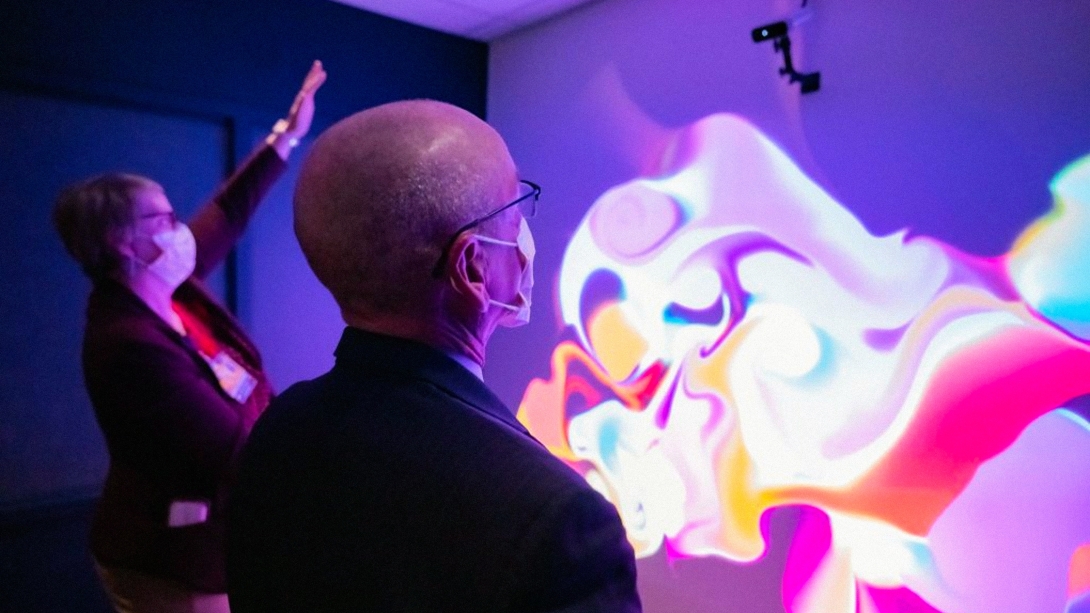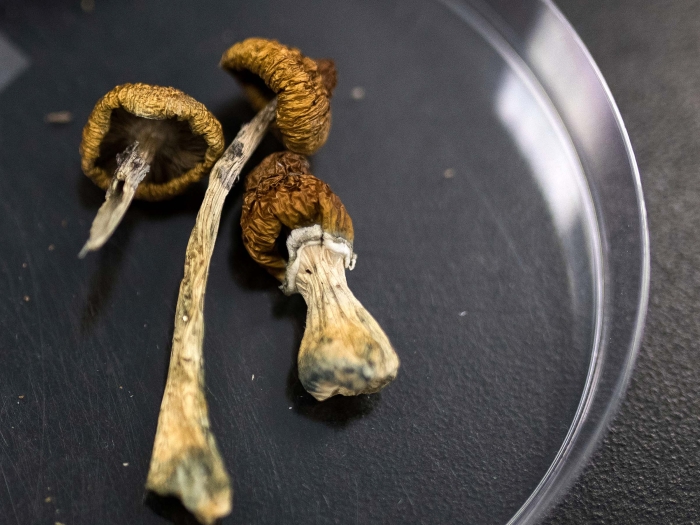The space provides employees with a transformative and healing experience before, during and after their shifts
10:28 AM
Author |

Recently, Michigan Medicine became the first health care system in the Midwest to bring Recharge Rooms to its employees. These innovative, immersive mental health interventions were designed to support the well-being and resilience of the hospital’s health care workers.
Here's how.
Helping team members flourish
The Flourish Recharge Room, made possible by a gift from Martin J. Tuck, D.D.S., M.S., in memory of his beloved wife Suzanne, is one of the first of its kind in the country to use technology that creates an interactive mind-body experience.
“Based on neuroscience, the bio-experiential design of this room is innovative for brain health,” said Robin Connelley, chief operating officer for Studio Elsewhere, a brain health innovation studio based in Brooklyn, New York, that helped to create the area.
Five different scenes bring concepts from nature into the hospital wellness space, with music, interactive technology and generative visuals that respond to the movements of the individuals using the space.
Connelley says the technology helps people transition into a flow state, which is a state of essential joy promoting healing and performance.
The unique multi-sensory experience takes the nervous system from fight or flight mode to relax and digest mode, which is something Connelley says can be achieved in as little as five or 10 minutes.
“The big thing is being able to come out of a very serious situation and step into a playful state,” she said. “That tells your body and your brain, ‘I’m safe, everything is okay,’ allowing your body to go into a recovery state.”
Connelley says the Flourish Recharge Room was designed to help health care workers thrive and perform at their highest potential.
A meaningful gift
Tuck, a retired endodontist who earned his Doctor of Dental Surgery degree from U-M, says his wife Suzanne, who passed away in October of 2021, was incredibly grateful for everything the nurses and patient care technicians did for her during her stay as a cancer patient at University Hospital.
“She wanted to give back to them,” he said, “and she wanted it to be something meaningful.”

Tuck felt just as strongly as his wife did about doing something for the people who had taken such good care of her.
“The nurses on this unit have a special place in my heart,” he said. “I’ve walked these halls many times.”
He approached Caty Johnson, a clinical nursing director on the unit where Suzanne was receiving care, for ideas on how he could support nurses in his wife’s memory. This one really resonated with him.
“This is such a healing gift for the morale of our teams,” said Chief Nurse Executive Nancy May, D.N.P., R.N.
Team members can use the room on breaks and before and after their shifts, providing a huge support for the mental and emotional well-being of staff.
This story originally ran in Michigan Medicine’s internal publication called Headlines. Navya Yerrapu additionally edited the piece to appear on Health Lab.
Sign up for Health Lab newsletters today. Get medical tips from top experts and learn about new scientific discoveries every week by subscribing to Health Lab’s two newsletters, Health & Wellness and Research & Innovation.
Sign up for the Health Lab Podcast: Add us on Spotify, Apple Podcasts or wherever you get you listen to your favorite shows.

Explore a variety of healthcare news & stories by visiting the Health Lab home page for more articles.

Department of Communication at Michigan Medicine
Want top health & research news weekly? Sign up for Health Lab’s newsletters today!





